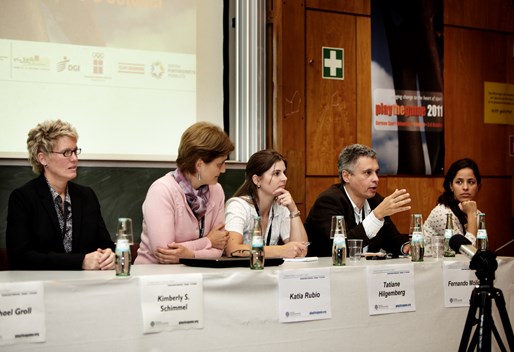Brazil is set to repeat mistakes from previous mega-events in 2012 and 2014

Speakers at the Brazil 2014 and 2016-themed session warn of unneccesary public spending on white elephants and material legacies. Photo: Tine Harden
05.10.2011
By Steve MenaryIn a session titled ‘Brazil 2014 & 2016 – Samba for the few?’, the audience listened to cautionary tales of unnecessary public investment in a country already saddled with white elephants from the 2007 Pan American Games and an increasing danger that future mega events will offer no benefits to low-income families.
Tatiane Hilgemberg, a professor at the Federal University of Juiz de Fora, questioned why - despite having years in advance to plan the stadia and infrastructure investments for the 2016 Olympics - the organisers were still going back to the government for more funding to build what could become white elephants.
She asked why this trend was still being mostly ignored by the Brazilian media, despite the previous experience from the 2007 Pan American Games, where furniture from the changing rooms at some of the sporting facilities built for that event had been stripped out.
“If athletes want to use it now, they have to put their clothes on the floor,” said Hilgemberg, who added that concerns over white elephant investments extended to the 2014 World Cup.
“We are building football stadia in places that do not have a football culture and people are not asking why. We need to put these concerns [for 2014 and 2016] out to the media but they are worried about the results of the athletes and winning medals, not the white elephants and the waste of our money.”
Housing deficit not helped by Olympics
Isabela Ledo, a masters’ student from the Technical University of Delft, produced information showing that the legacy of the 2016 Olympics will bypass low-income families as an opportunity to meet Brazil’s gaping housing deficit is passed up in favour of aiding big business.
According to data produced by Ledo, Rio de Janeiro has a need for 136,345 dwellings but the 2016 Olympics will produce just 24,000 rooms. If those 24,000 rooms were split into two-bedroom flats, that would provide just 12,000 apartments – or 8.8 percent of Rio’s housing deficit.
Of Brazil’s national housing deficit, 89.4 percent of rooms are needed by low-income families but Ledo identified just one project for social housing coming out of the Olympics. However, this 2,200-unit scheme was not for families being dispossessed by the 2016 Games but for people who had lost their homes in environmental disasters.
Ledo said: “There is no estimate of how many people will be relocated [for 2016]. It is not possible to assure that the 2016 Olympics will succeed in its legacy of social inclusion. Economic forces will benefit from the Olympics in Rio. The role of the IOC in promoting a legacy is yet to be seen.”
Legacies spiral out of control
Kimberley S. Schimmel, an associate professor in the Department of Sociology of Sport at Kent State University in the United States, warned that a pattern of 20 percent of forced evictions in every Olympic host between the 1988 Olympics in Seoul and the last Games in Beijing could be repeated in Rio. “Legacies are material,” commented Schimmel.
Too often those legacies spiral out of control with a revamp of Brazil’s famous Maracana stadium now expected to cost €416 million against an original estimate of €304 million and only 29 of 49 projects scheduled to improve access to airports and hotels in Rio having started.
A pledge made by Ricardo Teixeira, head of Brazil’s football association, the CBF, that the cost of the 2014 World Cup would be financed by the state sector has not been honoured. Brazil’s local and national authorities are now expected to invest an estimated €12.5 billion in staging the next World Cup.
A media trend of ignoring these problems is both historic and systemic said Fernando Molica, an experienced Brazilian journalist and member of Abraji, the Brazilian Association of Investigative Journalists.
“Brazil's sport press does not have a tradition of dedicating itself vigorously to the irregularities that occurred in sports entities,” said Molica. “There is not in sport a systemic coverage on the discovery of possible irregularities. A lot of Brazilians still believe that the Olympics and World Cup will generate a lot of business. Journalists have an obligation to cover what other sort of business there is, too.”





